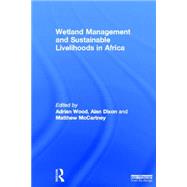Wetland Management and Sustainable Livelihoods in Africa
, by Wood, Adrian; Dixon, Alan; Mccartney, Matthew- ISBN: 9781849714112 | 1849714118
- Cover: Hardcover
- Copyright: 9/19/2013
It is only recently that the vital role of wetland ecosystems has been appreciated. Not only are wetlands the home to unique wildlife, but they also have a key role in water catchment management and in providing livelihoods to local people. Indeed their successful conservation is critically dependent on involving local people and providing for their livelihoods through agriculture, fisheries or other employment. This book examines the ways in which wetlands can be used sustainably to benefit rural communities in Africa. It focuses particularly on the use of inland wetlands for livelihood benefits, exploring the interaction between agriculture (crops and livestock rearing) and wetland ecosystem services. Key themes include: the growing importance of wetlands for agriculture and livelihoods in Africa; wetlands as multi-functional resources, with potentially a diverse range of ecosystem services; the environmental, social, economic and institutional dimensions of wetland sustainability; and reconciling the tensions between conservation and agro-development management approaches. The authors also stress the need for Integrated Water Resource Management and landscape approaches to ensure sustainable use of wetlands throughout a river catchment and the need for wetland management interventions to engage with a wide range of stakeholders. They also assess the feasibility of creating incentives and value in sustainable wetland use to support sustainable use. Drawing on ten empirical case studies the book highlights the different ways in which sustainable use for livelihoods has been sought, each case focusing on specific issues about wetlands and agriculture.







